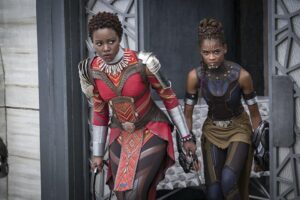by Kerry Torpey on April 19, 2018
Arts & Entertainment

by William Burleigh ’19
A&E Staff
T’Challa is still king. Black Panther has officially surpassed Titanic in the domestic box office. On Saturday, April 7, Black Panther outdid the 1999 epic’s $659 million when it reached $665 million. It is now the third highest-grossing film in North American box office history (not adjusting for inflation). It ranks number three behind 2015’s Star Wars: The Force Awakens’ $936 million and 2009’s Avatar’s $760 million.
Black Panther, the 18th film in the Marvel Cinematic Universe superhero franchise, has taken the box office by storm since its Feb. 16 release, breaking numerous records: it is currently the highest-grossing film of 2018, raking in over $1.3 billion worldwide. Black Panther has also become the highest-grossing superhero movie of all time, passing The Dark Knight and Marvel’s own The Avengers.
Black Panther features almost an entirely black cast, starring Chadwick Boseman, Michael B. Jordan, Lupita Nyong’o, and many more. Black Panther has been praised for its diversity not only onscreen but also behind the camera. Young African-American director Ryan Coogler had only ever made two other feature films and now holds the records for biggest box office debut for an African-American director and highest grossing film by and African-American director.
The film’s success and relevance extends far beyond its box office domination. The film also received universal critical acclaim and rave reviews—and not just for being an entertaining action movie. Since its release, Black Panther has been lauded by the black community for its cultural significance, and specifically, its emphasis on and commitment to underrepresented voices in a Hollywood blockbuster. This is an increasingly important task for mainstream films, as black audiences have been massively marginalized in the history of cinema.
One reason the film has been so vastly successful is because it offered black audiences a cinematic experience they have been sorely missing: a black superhero. White audiences have enjoyed nothing short of a plethora of superheroes to choose from: Iron Man, Batman, Superman, Captain America, Spider-Man and Thor alone have made a combined 35 appearances in major superhero movies since 2002. In this way, black audiences who sought inspiration and entertainment from a superhero who looked like them have been left underwhelmed for many years.
The need for representation obviously transcends the superhero genre. The history of film as a whole has been dominantly populated by white voices. The most iconic characters of all time—James Bond, Indiana Jones, Luke Skywalker—are all white. If you Google-search “best actors of all time,” the automatic top 50 listed results display only four people of color. Searching results for “best directors of all time” displays only two people of color in its top 50. Some of the greatest movies—The Godfather, Casablanca, It’s A Wonderful Life, Fight Club, and The Lord of the Rings—feature no black characters and require African-American audiences to view their stories through the eyes of white characters.
And yet Black Panther has still made more money than all of them in just eight weeks. Now more than ever, black audiences are finding themselves represented in mainstream films. Two years ago, Moonlight (2016) won the Academy Award for Best Picture. Last year, Get Out (2017) made $176 million and won Best Original Screenplay. This year, director Christopher Nolan, The Dark Knight trilogy, Inception, has predicted that Black Panther will become the first ever superhero movie to be nominated for Best Picture.
Ultimately, Black Panther and its box office records serve as a testament to the strength of diverse voices and the increasing need for more representation in Hollywood films of all genres and budgets. Black Panther will of course be remembered as an entertaining movie. But, more importantly, Black Panther’s cultural relevance, as both the first mainstream black superhero movie and a major blockbuster will resonate universally with audiences of different backgrounds as a source of hope, affirmation, and inspiration.